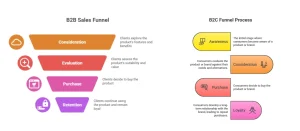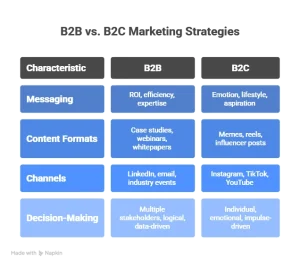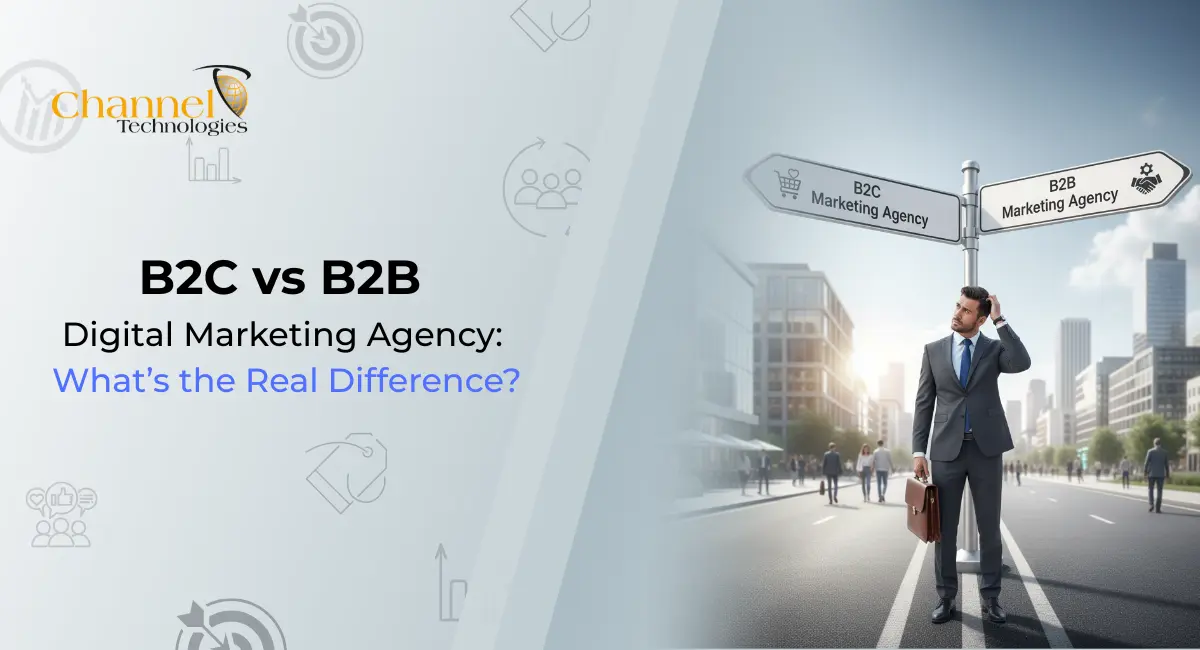What Is This Blog About?
This blog goes beyond the simple “business vs consumer” divide to explain the real differences between a B2C and a B2B digital marketing agency. It covers how customer journeys and sales funnels differ, what makes B2B marketing unique, and why tech companies especially benefit from B2B digital marketing services—with practical insights to help you choose the right agency.
Who Should Read It?
- Business owners and decision makers choosing between B2C or B2B marketing agencies
- Marketing managers refining strategies for unique sales cycles
- Tech leaders exploring B2B digital marketing benefits
- Entrepreneurs entering new markets and clarifying customer journeys
- Anyone evaluating the right digital marketing agency for their busines
Why Is This Important Right Now?
Buyer behavior is shifting fast—B2C customers demand speed and personalization, while B2B buyers seek trust, detail, and long-term value. With crowded digital channels and complex sales cycles, businesses can’t afford misaligned strategies. Knowing the difference between B2C and B2B marketing is critical for growth, especially in competitive markets like tech, SaaS, and consumer goods.
What You Can Do With This Insight?
By understanding the differences in customer journeys, funnels, and strategies, you can:
- Choose an agency that fits your business model
- Align campaigns with real buyer decision-making
- Leverage B2B expertise in tech or high-value markets
- Build sustainable pipelines driven by actual behavior
Digital marketing is no longer optional—it’s the heartbeat of how brands grow. But here’s the catch: B2C vs B2B digital marketing is not interchangeable.
The B2C sector channels 6.50% of revenue to its marketing budget, while B2B companies devote 7.8% of revenue to their marketing budgets.(1)
Mix them up, and we’ll either bore consumers with too much technical detail, or leave business buyers unimpressed with vague, feel-good messaging. That’s why knowing whether one needs a B2B digital marketing agency or a B2C-focused one is such a game-changer.
The DNA Of B2C vs B2B Digital Marketing
At the core, the difference comes down to the audience and the language you speak.
- B2C digital marketing is about sparking emotion and action in individuals. Think Nike’s “Just Do It” campaign—it doesn’t explain shoe specs; it inspires a lifestyle. A reel on Instagram, a limited-time offer, or an influencer partnership are some strategies in 2025 driving immediate conversions.
- B2B digital marketing, however, is about trust and authority. Salesforce doesn’t win deals with slogans—it wins by showing how its CRM can increase sales efficiency by 25%.(2)
B2B buyers need evidence, case studies, and ROI-focused content before they make a move.
Pro tip: If your customer needs proof before making a decision, you’re in the B2B game. If they need desire, you’re playing in B2C.
1. Mapping The Customer Journey
The B2C vs B2B customer journey couldn’t be more different.

- B2C journeys are quick and more often than not, emotionally accentuated. A human sees a Starbucks ad on Instagram, and he’s sipping a Pumpkin Spice Latte within an hour. One interesting case of brand- customer relationship that exploded on the internet was of Chewy, a brand that deals in pet products and essentials.
- B2B journeys are often slow, deliberate, and collaborative. According to Gartner, the average B2B buying group includes 6–10 decision-makers.(3) Each of them consumes multiple content pieces before even contacting sales.
That means a B2B marketer has to guide buyers through research reports, webinars, and case studies—far more than a simple ad.
2. Sales Funnel: Why One Size Doesn’t Fit All
Let’s break down the sales funnel in B2B vs B2C:

-
Awareness Stage:
- B2B: Awareness is the first step in the sales funnel. Businesses often rely on inbound marketing tactics like SEO, thought leadership content and paid ads to create awareness. The goal being to attract decision-makers who are seeking tailored solutions for their business needs.
- B2C: In B2C, awareness is driven through marketing efforts like TV ads, social media campaigns, search engine marketing and most recent influencer marketing. The latter being the most sought-after tactic to deliver the customer needs.
-
Consideration Stage:
- B2B: This is the next step in the funnel, and at this stage businesses are evaluating solutions with an eye on ROI, scalability and future-growth needs. What works best here are content like case studies, blogs and webinars, etc.
- B2C: On the other hand, B2C customers may rely on influencer recommendations, comparison websites and reviews. Study shows that 9 out 10 customers read reviews before buying a product. (4)
-
Decision Stage:
- B2B: It typically involves multiple stakeholders responsible for making decisions for the growth of the business
- B2C: here, the decision-making process is most instant and involves motivations rather than long-term ROI calculations. The focus is largely on satisfying instant customer needs.
-
Retention Stage:
- B2B: customer retention in B2B often involves ongoing communication, follow-ups and account and fund management.
- B2C: On the other hand, B2C retains customers using mediums like newsletters, loyalty programs, and reminders. According to Forbes, 50% of existing customers are likelier to try new products and 31% spend more than new customers — a compelling case for why retention deserves your focus.(5)
The Bottom Line:
A B2B funnel requires patience and layered content. And a B2C funnel thrives on speed and repetition.
Key Differences In Digital Marketing Strategies
Here are the key differences between B2C and B2B digital marketing strategies:

In B2B, the driving question for buyers is simple: “Will this solve my business problem?” That’s why messaging revolves around ROI, efficiency, and expertise. It’s less about flash and more about evidence—how your solution impacts cost, productivity, or competitive advantage.
In contrast, B2C buyers are guided by a different question: “Will this make my life better, easier, or more enjoyable?” Campaigns lean on lifestyle, aspiration, and emotion to spark instant action, whether it’s a sense of belonging or the thrill of a limited-time offer.
The decision-making process is also worlds apart. According to Corporate Visions (2025), the average B2B purchase involves 10–11 stakeholders, making the journey longer and more collaborative.(6) B2C, on the other hand, is typically individual and impulse-driven—sometimes a matter of minutes between awareness and purchase.
Inside A B2B Digital Marketing Agency: How It Really Works
At Channel Technologies, 27+ years of B2B experience taught us one simple truth: marketing basics are shared, but how a B2B digital marketing agency works is purpose-built for complexity. If you think in terms of B2C vs B2B digital marketing, the difference isn’t just channels — it’s intent, timelines, and who’s involved in buying. The same person who clicks a sneaker ad at 10pm is often one of several stakeholders in a multi-month B2B purchase the next week.
Here’s the truth: while B2C agencies focus on clicks, quick sales, and wide reach, a B2B digital marketing agency focuses on quality over quantity of leads. The sales funnel in B2B vs B2C couldn’t be more apart—longer timelines, more stakeholders, and decisions that impact entire businesses.
So what actually happens and matters behind the scenes at a B2B marketing agency like ours? Here’s a look:
1. Finding The Right People
In B2C, you can run a campaign that reaches thousands and get instant results. But in B2B, it’s not about volume—it’s about relevance. We help clients get discovered by the right decision-makers using niche SEO, LinkedIn campaigns, and high-value resources like whitepapers, blogs and targeted ads. According to HubSpot’s 2025 State of Marketing Report, SEO and content still drive the highest-quality B2B leads.(7)
2. Creating Demand That Lasts
Rather than shouting louder, B2B marketing is about building credibility. That means publishing thought-leadership content, hosting webinars, or producing case studies that prove real business impact. This approach doesn’t just generate leads—it creates market pull and positions your brand as a trusted partner, not just a vendor. We have created many such content pieces along with suitable marketing and fund management for our partners resulting in desired results.
3. Nurturing Leads Into Opportunities
In B2C, a discount code might close a sale overnight. In B2B, leads take months—sometimes longer—to become customers. We nurture them to convert with carefully timed emails, retargeting ads, and content that speaks to each stage of their journey. Industry studies show nurtured leads make larger purchases and convert more often than those left to drift.
4. Measuring What Really Matters
The metrics are another big difference between B2C vs B2B digital marketing. In consumer campaigns, you’ll often see success measured in clicks or ad spend efficiency. In B2B, what matters is the pipeline—how many Marketing Qualified Leads (MQLs) become Sales Qualified Leads (SQLs) and whether marketing is shortening the sales cycle.
5. How It All Ties Together
Take a SaaS client, for example. Instead of running a flashy ad promising instant results, we might launch a LinkedIn campaign offering a whitepaper or a webinar on “Cutting IT Costs with Automation.” That one asset attracts IT and finance leaders, sparks conversations, and builds a sales-ready pipeline. Over time, it leads to demos, pilots, and contracts.
This is the real value of working with a B2B digital marketing agency. The focus is more towards creating measurable growth, building trust, and helping businesses win in competitive markets.
Advantage Of B2B Digital Marketing Agency – Our Edge
This is where things get specific. At Channel Technologies, we’ve worked with leading B2B IT companies in India for nearly three decades, and one pattern is clear: while marketing fundamentals may overlap across industries, the impact of B2B digital marketing—especially in IT and tech—is on another level.
Why? Because IT is diverse and tech is complicated. Whether it’s SaaS, cybersecurity, or cloud solutions, buyers aren’t looking for buzzwords or abstract promises. They want clarity. They prefer to know: What does this solution mean for my business outcomes?
That’s where a strong B2B digital marketing strategy creates tangible value.
What a good B2B digital marketing agency does (practically):
- Translating complexity into outcomes – Features like “AI-driven detection” mean little until reframed as “protecting customer trust and lowering breach costs.” This translation bridges engineers and executives.
- Building authority with thought leadership – Content like whitepapers, case studies, and webinars aren’t filler—they’re credibility builders. In fact, 64% of decision-makers say thought leadership is a more trustworthy way to assess a company’s capabilities than traditional marketing (Edelman & LinkedIn, 2024 Thought Leadership Impact Report).(8)
- Positioning companies as partners, not vendors – winning B2B brands don’t just sell software—they sell confidence. Slack, for example, never positioned itself as “chat software.” Instead, it marketed “simpler, more productive, and more connected work.” That slight shift created trust.
- Focusing on quality leads, not metrics – unlike consumer marketing, B2B isn’t about likes or clicks—it’s about finding the right people inside the right organizations. Targeted campaigns on LinkedIn or niche search keywords work better than mass ads.
For tech and IT companies in particular, a B2B digital marketing agency acts as a translator, a credibility engine, and a pipeline accelerator. The work is methodical — building content that proves, campaigns that target, and nurture that converts — and the results are measurable when strategy and execution align.
An important question that crops up is — Which Digital Marketing Agency Is Right for Your Business? Well, the answer follows the buyer: if your customer buys solo in minutes, a B2C playbook wins. If multiple stakeholders, approvals and ROI matter, you need a B2B digital marketing agency that orchestrates content, outreach and nurturing across a longer B2C vs B2B customer journey. Therefore, hiring a right agency is crucial for the marketing outcomes of your business.
Conclusion: The Real Difference That Impacts Growth
By now, it’s clear that the gap between a B2C and B2B digital marketing agency isn’t small—it’s massive.
So, what should you choose – B2C or B2B digital marketing agency?
My take: it depends on your buyer. If your customer is an enterprise CIO, you need patience, content, and proof. If your customer is a teenager on TikTok, you need speed, creativity, and relevance.
The real difference?
Marketing isn’t about choosing between B2B and B2C. It’s about clarity—knowing your buyers, their journey, and building the right bridge to reach them. The agency is just the architect that helps you design it.
We’ve looked at how the B2C and B2B customer journeys differ, why the B2B funnel tends to be more complex, and how tailored digital marketing strategy can make that journey smoother and more effective.
At the end of the day, the strategies you choose are only as strong as the partner helping you execute them. With the right digital marketing agency whether B2B or B2C by your side—one that understands your industry, your audience, and your growth goals—you can turn these insights into real momentum.





